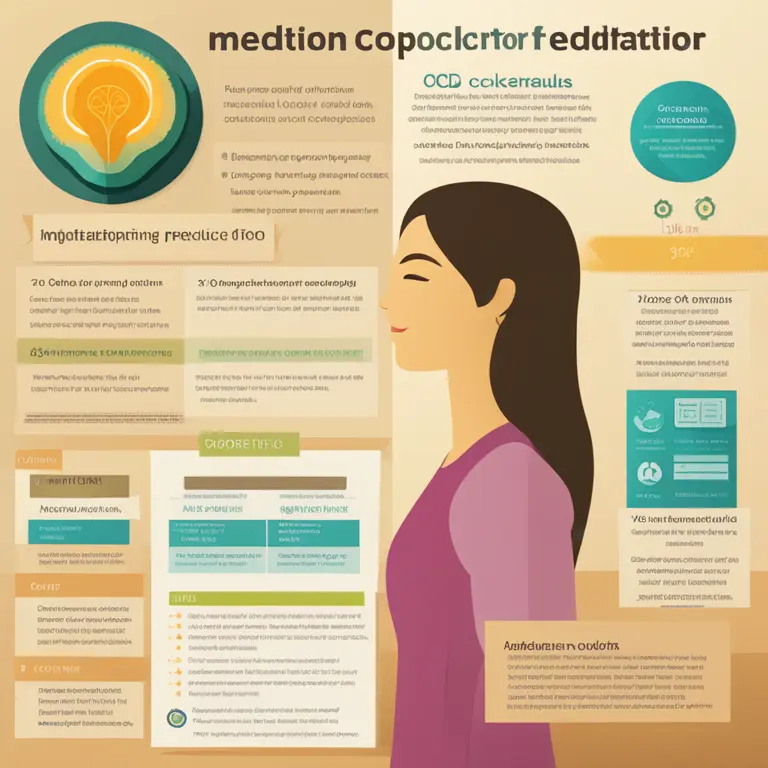
Meditation's Role in Managing OCD Symptoms
Discover whether meditation can be a beneficial practice for individuals dealing with Obsessive-Compulsive Disorder (OCD) and how it may impact symptom management.
article by Hina Kurosawa
Mental Health and Mindfulness
Meditation has long been heralded for its benefits in reducing stress and improving mental health. For those struggling with Obsessive-Compulsive Disorder (OCD), a condition characterized by intrusive thoughts and repetitive behaviors, finding methods to manage symptoms is crucial. As we progress further into the 21st century, the integration of mindfulness and meditation into therapeutic practices has gained significant attention. Emerging research and clinical reports suggest that meditation, particularly mindfulness-based techniques, may offer a complementary approach to traditional treatments for OCD.

Meditation's Mechanism on the Mind
Meditation influences the mind by fostering a heightened state of awareness and focused attention. For OCD sufferers, the crux of the problem lies in the struggle to detach from obsessive thoughts. Mindfulness meditation teaches individuals to observe their thoughts non-judgmentally, enabling them to recognize and disrupt the cycle that leads to compulsive behaviors. Cognitive Behavioral Therapy (CBT), a standard OCD treatment, shares similarities with mindfulness practices, as both encourage individuals to change their reaction to intrusive thoughts.

The Evidence Supporting Meditation
Recent studies have provided insights into the potential benefits of meditation for OCD. For instance, research indicates that mindfulness meditation can reduce anxiety and depression, which are often comorbid with OCD. Neuroimaging studies have also shown that regular meditation can lead to changes in brain regions associated with OCD, such as the anterior cingulate cortex and the prefrontal cortex, hinting at its potential to help rewire the brain's response to obsessive-compulsive triggers.

Integrating Meditation into Treatment Plans
Despite promising findings, meditation is not a cure-all and should not replace traditional therapy or medication. Instead, it provides an additional tool that individuals can incorporate into their treatment regimen. Mental health professionals may recommend mindfulness exercises as part of a more comprehensive treatment plan, which might also include medication, therapy, or both. Tailoring meditation practices to the individual's needs is essential, as OCD manifests differently in everyone.

The Practicality of Meditation Practices
One of the appealing aspects of meditation for OCD management is its accessibility and cost-effectiveness. Individuals can practice meditation in various settings without the need for specialized equipment or extensive training, making it an approachable complement to traditional treatments. Simple practices such as focused breathing, body scans, or guided imagery can act as starting points for those new to meditation.
Limitations and Considerations
It is crucial to acknowledge the limitations of meditation in treating OCD. Some individuals may find that focusing inwardly can initially exacerbate anxiety or intrusive thoughts. In such cases, a gradual approach with professional guidance is recommended to ensure that the practice becomes beneficial rather than overwhelming. Meditation is not a one-size-fits-all remedy and the pace of progress will vary among individuals.
Final Thoughts on Meditation and OCD
As we embrace the future of mental health treatment, the importance of adaptable and varied therapeutic options becomes clear. Meditation offers promise as part of a multifaceted approach to OCD management. However, further research is needed to fully understand its effectiveness and best practices. Those interested in exploring meditation for OCD should consult with a healthcare professional to tailor a plan that fits their unique situation.
Published: 1/14/2024
Modified: 1/15/2024
More predictions
Come back here soon to learn more about yourself and your future


Easing Loneliness with Mindfulness Meditation
Explore how mindfulness meditation can provide solace and connection to alleviate the feelings of loneliness.


Easing Loneliness with Meditation
Discover how mindfulness meditation can provide solace and connection to mitigate feelings of loneliness, enhancing emotional and mental well-being.


Mindfulness Meditation Basics for First Graders
Introducing foundational mindfulness meditation practices to instill calm and focus in first-grade students.